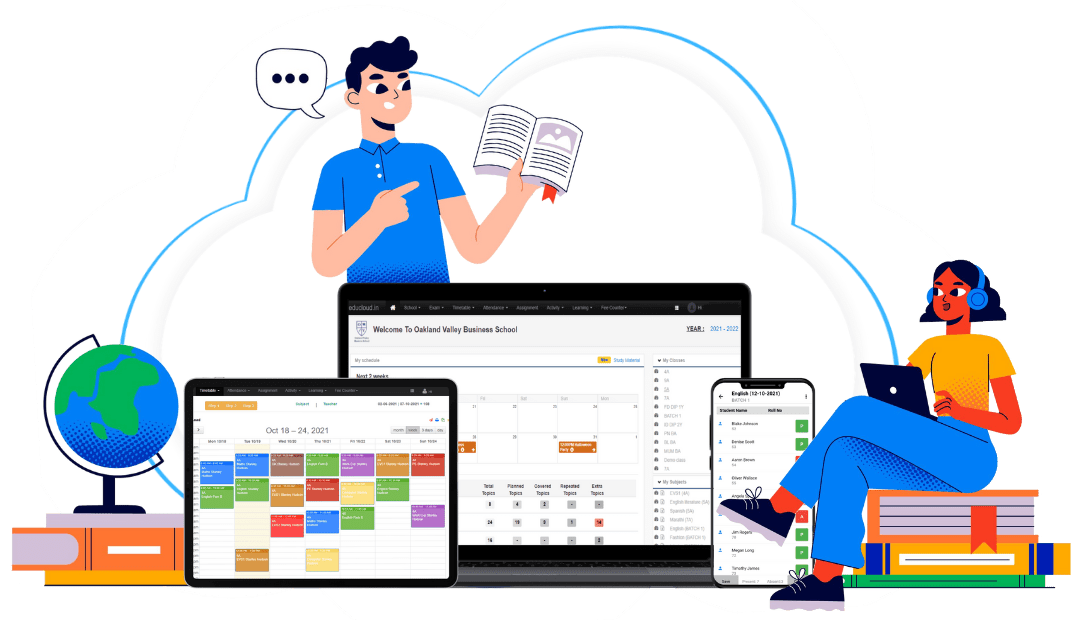
Navigating through the digital realm of education, the incorporation of School ERP (Enterprise Resource Planning) systems has become a linchpin for effective school management. Implementing ERP for schools ensures seamless integration of various operational facets, from administration to financial management. This comprehensive guide ventures through selecting, implementing, and managing School ERP systems, providing a roadmap towards structured and efficient educational management.
- Embarking on the Selection Journey: Identifying the Right School ERP System
- Aligning with Needs: Understand and outline the specific needs and challenges of your school to select an ERP system that aligns seamlessly with its operational landscape.
- Scalability and Customization: Opt for School ERP solutions that offer scalability and customization, ensuring relevance and adaptability as your institution evolves.
- Streamlined Implementation: Crafting a Smooth Transition to Digital Management
- Strategic Planning: Formulate a structured plan outlining the implementation stages, timelines, and roles to ensure a systematic transition to the ERP system.
- Stakeholder Training: Ensure that all stakeholders, from educators to administrative staff, are adeptly trained to navigate and utilize the ERP system efficiently.
- Robust Financial Management: Navigating Through Systematic Financial Operations
- Automated Financial Handling: Employ ERP for schools to automate financial processes, enhancing accuracy and transparency.
- Efficient Budget Management: Utilize the ERP system for strategic budget planning, allocation, and management, ensuring optimized resource utilization.
- Administrative Excellence: Ensuring Organized and Efficient Operational Management
- Centralized Data Management: Implementing School ERP systems ensures centralized, coherent, and consistent data management.
- Automated Scheduling: Leverage ERP solutions to automate scheduling, ensuring structured and efficient operational flows.
- Effective Communication: Bridging Stakeholders through Transparent Interaction
- Cohesive Communication: Employ the communication modules of the ERP system to ensure transparent, consistent interaction among educators, parents, and students.
- Collaborative Platforms: Utilize platforms within ERP for schools to facilitate collaborative, supportive educational ecosystems.
- Continuous Assessment and Enhancement: Ensuring Ongoing System Optimization
- Regular Assessment: Periodically assess the efficiency and relevance of the ERP system, ensuring it continues to align with institutional needs.
- Adaptive Management: Implement necessary upgrades and adaptations to the ERP system to navigate evolving demands and technological advancements.
- Ensuring Security and Compliance: Safeguarding Institutional Integrity
- Data Protection: Ensure the School ERP system adheres to global data protection standards, safeguarding institutional data integrity.
- Compliance Adherence: Ensure systematic, compliant data management and reporting, shielding the institution from legal discrepancies.
- Post-Implementation Support and Management: Navigating Forward
- Continuous Support: Ensure access to ongoing support from the ERP provider to navigate challenges and utilize the system optimally.
- Periodic Reviews: Engage in periodic reviews and feedback with all stakeholders to continually enhance and optimize the ERP system’s functionality and user experience.
Conclusion: Crafting the Future Through Structured, Efficient School ERP Management
Embarking on the journey of selecting, implementing, and managing School ERP systems, educational institutions are not only navigating towards structured, seamless management but are also crafting an enriched, supportive educational journey for all stakeholders. From ensuring alignment with institutional needs, structured, systematic implementation, robust financial management, administrative excellence, transparent communication, ongoing assessment and enhancement, ensuring compliance and security, to ensuring continuous post-implementation support, School ERP systems stand pivotal in ensuring educational institutions are adeptly equipped to navigate the contemporary educational landscape. Moving forward, as we dive deeper into the digital realm of education, the strategic incorporation and management of ERP for schools stand as a cornerstone, ensuring educational experiences are not only enriched and accessible but are also delivered through structured, systematic, and seamless operational frameworks, crafting a future where education is effectively managed, and comprehensively delivered.
